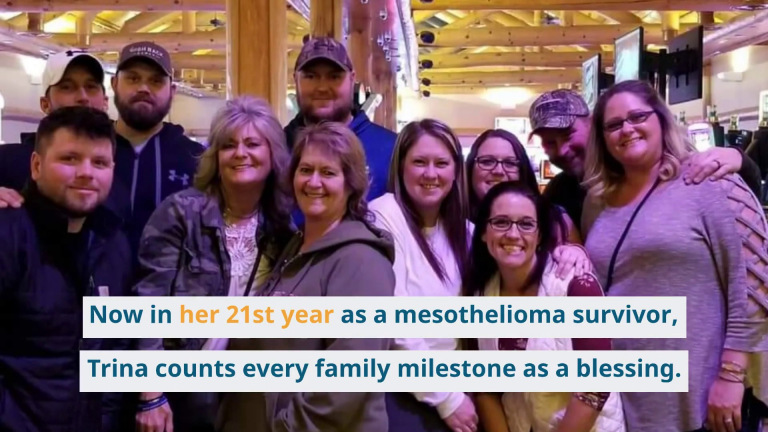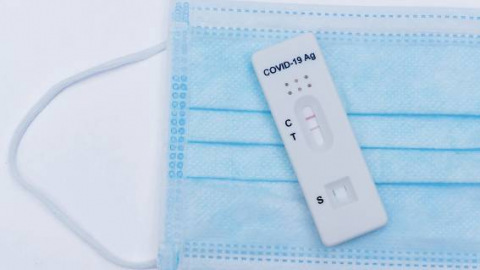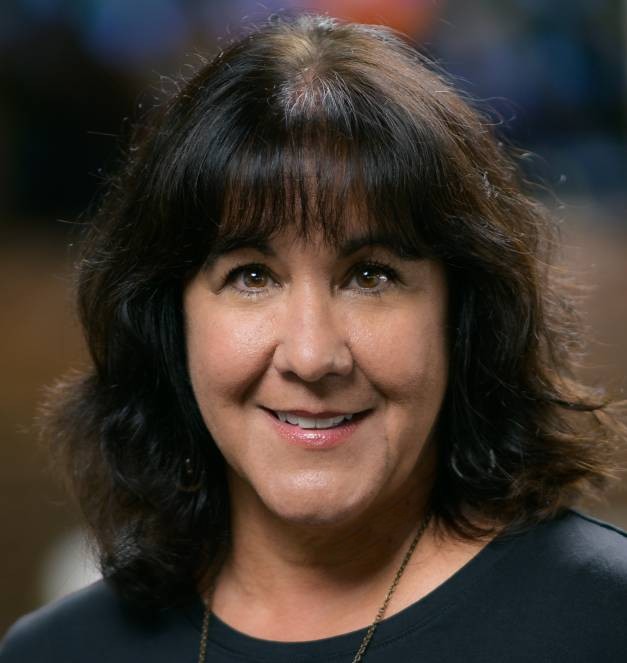20-Year Mesothelioma Survivor Reflects on Her Journey
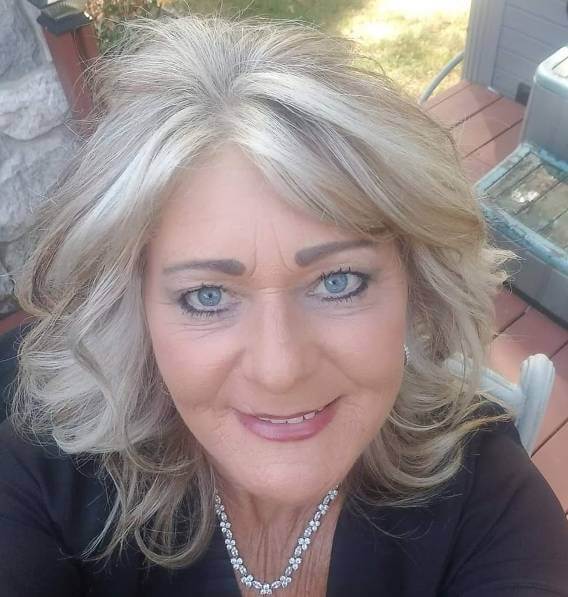
Written by Fran Mannino | Edited by Amy Edel | Last Update: 08/05/2025 | 6 Min Read
A lot of life can be lived in 20 years, and Trina Reif is proof of that. Now in her 21st year as a mesothelioma survivor, Trina counts every family milestone as a blessing.
“I said if I could make my 20-year mark, I’d be so thrilled,” Trina told The Mesothelioma Center at Asbestos.com. “Every birthday is a blessing. Every year the good Lord gives me, I’m going to take.”
She was diagnosed with peritoneal mesothelioma on Sept. 11, 2001. For Trina, memories of 9/11 and the impact of her mesothelioma cancer diagnosis are forever linked. She was fortunate to have a caring OB/GYN, Dr. Anton Strocel, to help her through it all.
“He had been taking care of me since I was 15,” Trina noted. “He is so proud. He says, ‘She is my survivor. She is my miracle.’”
Diagnosing a Rare Disease
Strocel had already treated Trina for years because of pelvic pain. She’s previously had surgery for endometriosis.
“She did well for a while,” Strocel recounted. “Some time later she presented to me with unexplained ascites (excess abdominal fluid). Subsequently we did an exploratory laparotomy and did an omentectomy, an appendectomy and multiple peritoneal biopsies for an angry looking peritoneum.”
“The pathological diagnosis turned out to be abdominal mesothelioma,” he added. “This being rare, I had to do a Med search on this and saw that the prognosis was dismal, with survival being only 6 months.”
Strocel said an initial consultation with an oncologist resulted in no recommendations for therapy, but he did not stop there. He then sent Trina to research specialist Dr. James F. Pingpank at the National Institutes of Health in Bethesda, Maryland. Pingpank performed a HIPEC procedure, which is a two-step process that first involves surgery to remove tumors and then intra-abdominal heated chemotherapy.
Trina said recovery was challenging, but she’s proud of how far she’s come. And so is Strocel.
“To date, Trina is happily doing very well – a bit of pride for my help!” he said.
Mesothelioma Diagnosis Has an Impact on Families
Trina knows the impact illness can have on families. When she was 8 years old her father died. When she was 26 years old her mother died. Her brother died just months before Trina’s mesothelioma cancer diagnosis and she recently lost a sister.
“My son is now 35. He never really dealt with [my diagnosis] at that time. He was only 15 years old. He stayed busy with sports.” Trina said. “Now it has come back to haunt him. He’s been in counseling. We talked about a few things and he got all choked up. He said, ‘I realize now, all these years later, how truly lucky I am to have you.’”
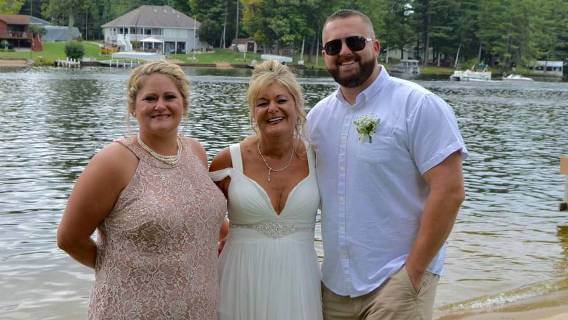
Trina credits her family with keeping her going through treatments and navigating such a daunting prognosis.
“It was a total eye-opener at 36 years old to know you are going to die. All you can do is stay strong,” she said. “My ex pushed me through it – he and my sister. They pushed me and pushed me. He’s like, ‘If you can’t get up, then you tell your kids you’re just going to lay here and die.’”
Staying Safe During the Pandemic
Over the past 20 years, Trina watched her children grow up, and found new love with an old friend. She and her husband Steve, an over-the-road truck driver, knew each other in high school and eventually reconnected through social media.
“He’d pick me up every day when I was a freshman and he was a senior and take me to school. We were always only friends,” she said. “Nine years ago, I reached out to him on Facebook and we met up for a couple of drinks and dinner. He never went away after that.”
When the country began shutting down in 2020 because of the Covid-19 pandemic, Trina and her husband were traveling out west in his semi. At the time she told him, “I have no spleen. I have no immune system. If I get sick, I go completely down.”
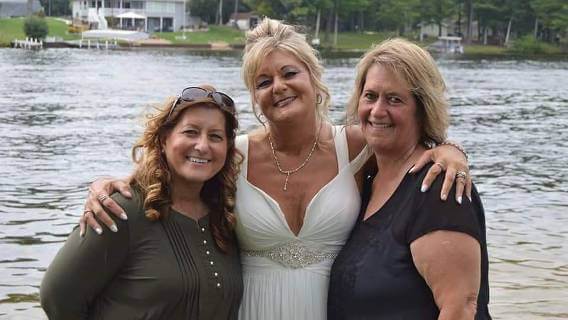
They weathered that storm, but recently her husband wasn’t so lucky.
“We were in California in November and he ended up with Covid,” Trina said. “I had to call an ambulance for him and they had to take him to the hospital.”
Trina stayed in the truck alone for five hours until her husband was released. But he was still very sick.
“He had trouble breathing and couldn’t lift his head up. This went on for 10 days,” Trina recalled. “Once I knew he was fine, I worried – oh my God am I going to get it? By the grace of God, I didn’t.”
She has remained cautious throughout the pandemic. Trina noted she had some hesitation when it came to the Covid vaccine because of the unknowns, but staying healthy won out.
“My family stayed apart during Covid,” she explained. “When I did decide to see my son, he said, ‘You have to get vaccinated.’ I was and I still am very scared. If I get it [Covid], will I be able to fight it? I’d rather be safe. I was on my deathbed once, and I don’t want to go there again.”
Compassion Drives This Mesothelioma Survivor
A lot has changed for Trina since her mesothelioma surgery. Her kids have grown up and she now has grandkids to enjoy. She keeps in touch with other mesothelioma survivors and the families of those who have lost someone to the disease.
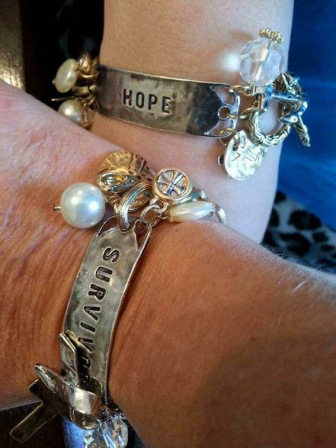
Strocel, Reif’s OB/GYN, retired three years ago. The news hit Trina hard. “Oh, did I cry,” she said, adding that she and Strocel still keep in touch.
Trina, who lives in Michigan, enjoys traveling and spending time with her family. Her son lives in Pittsburgh and her daughter is in Tennessee, so she visits them when possible.
“I just live, go trucking with my husband and take care of his mother when I can,” Trina shared. “She’s 83 and in hospice. This is what people tell me, and they told me after this happened: The good Lord gave me the second chance because of the caregiver I am.”
Trina added that her daughter, who has supported her on her journey since the beginning, is about to turn 40. “I’m watching her get gray hair and I love it,” Reif said.
“I have four grandsons, and I’ve been able to see them,” she added. “They’re my life.”
“It’s been 20 years, and I’m good,” she affirmed. “Do I look at my scar every day when I take a shower? Absolutely, but every scar shows you’re a survivor. If you can show your scar, that means you’re still alive.”

